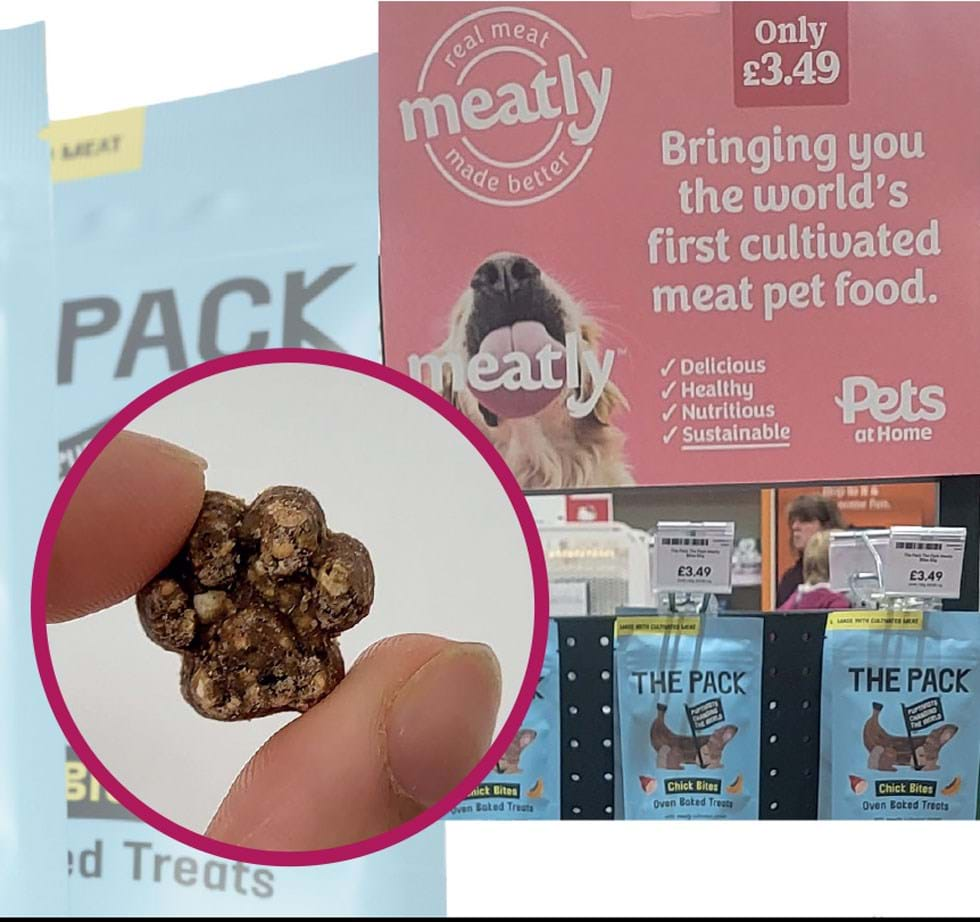A Cell-cultivated Meat-y Issue
The UK’s first cultivated meat product isn’t for humans – it’s for pets. But as dogs dig in without hesitation, Aniqah Majid asks what it will take to get it from feeding bowls to people’s plates

IN FEBRUARY, the UK got a taste of its first-ever commercial cell-cultivated meat product – and it came in the form of pet food.
London-based manufacturer Meatly launched Chick Bites, a dry dog treat made with 4% cell-cultivated chicken breast and a mix of vegetable proteins. The product is available for a limited run, and only one location – a Pets at Home in Brentford, southwest London.
Branded as the “world’s first cultivated pet food”, the company promises that Chick Bites are just as nutritious as traditional chicken breast – containing all the essential amino acids, critical fatty acids, minerals and vitamins.
“Cultivated meat offers a way to feed our pets real, nutritious meat, without the environmental footprint or need to harm animals,” says Owen Ensor, the CEO of Meatly.
With only 40 bags remaining for purchase, I promptly made my way to Brentford. Stacked in a far-off corner of the store, next to the doggy gilets, the pouches do not look dissimilar to your typical dog treat packaging, save for clear labelling, front and back, that informs you that the product contains cultured chicken meat. Further information explains that the cells came from a chicken embryo. Inside, the treats were not in fact bits of Quorn-like meat as I had assumed, but paw-shaped snacks with a very authentic pungent dog treat aroma.

Cultivated meat for humans is yet to hit the market in the UK, but thanks to Meatly’s breakthrough and a two-year Food Standards Agency (FSA) research programme, lab-grown meat may be closer to the shelves than you think.
After distributing the Chick Bites to friends and colleagues with dogs, the feedback was surprisingly similar. Their dogs ate the treats and there was no sense of caution. Perhaps they could not tell the difference? Perhaps they didn’t care?
“My dog eats anything really,” said a friend. Humans, research has found, are far more discerning.
A study by the Food Standards Agency (FSA) showed that only a minority (14–40%) in the UK are willing to try cell-cultivated meat. The same study found that 85% of the public were concerned about the safety of the product.1 The statistics are more promising among engineers, with 59 of 100 TCE readers telling us last month that they would eat lab-grown meat.
Concerns over safety may relate to the manufacturing of meat being so removed from traditional farming,. However, regulators around the world are looking to develop systems which use rigorous testing, while leaning on existing regulation from the farming industry.
Faux gras and bird parfait
The first cell-cultivated meat burger was eaten live on TV in 2013 in London. Mark Post, a Dutch scientist from Maastricht University, had made a hamburger comprising cell-cultivated beef.
“This is meat to me. It’s not falling apart,” Hanni Ruetzler, a food critic who tried the burger told the BBC.
Since then, around 155 companies dedicated to cell-cultivated protein manufacturing have been founded, with most coming from the US, Israel and UK.
In 2020, Singapore became the first country to approve cell-cultivated meat, with a shredded chicken product manufactured by US company Eat Just – the product contained 3% cell-cultivated chicken mixed with plant protein. The country later approved the sale of cultivated quail in 2024, with Australian company Vow developing a quail-based “faux gras” product made from 51% cell-cultivated quail meat, available at select restaurants.
A 2022 cross-country study found that Singaporeans were more accepting of lab-grown meat than Americans, with the openness being attributed to social image and the need to be seen as “trailblazers”.2
The US’s regulations on cell-cultivated products differ state by state. Cultivated chicken was approved for human consumption nationwide in 2023, with limited runs being developed by Eat Just and Upside Foods. However, in 2024 and 2025, cultivated meat was banned in Mississippi, Alabama and Florida.
To catapult research into cell-cultivated meat, the FSA has launched a two-year programme looking into whether there is a case for cell-cultivated meat to be produced in the UK, considering factors related to hygiene, labelling, toxicological and microbiological hazards, and scalability. As part of the programme, the FSA will launch an international network to bring together regulators from around the world to share advice and insight on cell-cultivated meat.
Recent Editions
Catch up on the latest news, views and jobs from The Chemical Engineer. Below are the four latest issues. View a wider selection of the archive from within the Magazine section of this site.




